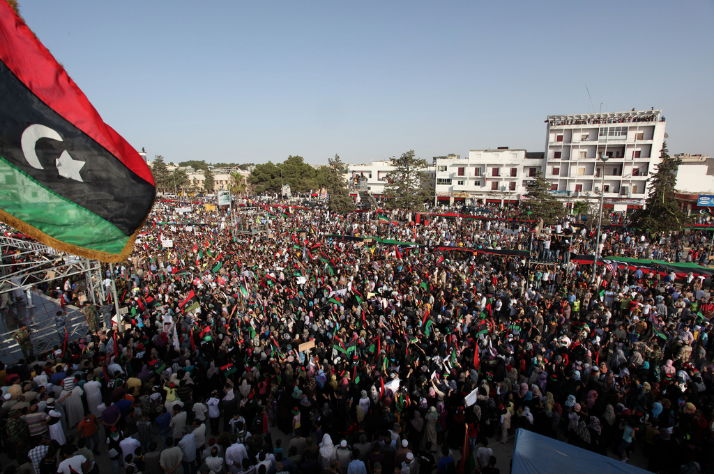Slave Trade in Libya
Imagine living in a world where housing was considered to be a human right, where education was free, where there was universal health care, where the sales of oil would directly benefit its citizens financially. Shocking to many, this world is pre-2011 Libya, under the Gaddafi regime, according to CNN. This is what NATO and other oil hungry western powers don’t want you to realize.
Gaddafi’s regime was far from perfect though. It was by no means a democracy, with its leader maintaining a tight and occasionally brutal authoritarian grip on its people for almost 40 years. However, for most of his regime, he was considered by the west to be an important ally in international affairs. Where did the perspective change?
There’s one credible theory I would like to analyze, and like most motivation for transcontinental military intervention, oil is involved. For most of the Gaddafi regime, oil was sold in U.S. dollars, as the U.S. is one of the highest consumers of oil in the world. However, towards the end, Gaddafi planned to reverse that, insisting Libya sell it in an African backed currency called Dinar instead, and pushed other resource-heavy African countries to do the same. Creating this solidarity within the African community would be a huge blow to the international stronghold that neo-colonialism has held for decades after European occupation of African nations. Gaddafi himself actually commented on the matter.
“They want to do to Libya what they did to Iraq and what they are itching to do to Iran,” Gaddafi once wrote, according to CNN. “They want to take back the oil, which was nationalized by these countries’ revolutions. They want to re-establish military bases that were shut down by the revolutions and to install client regimes that will subordinate the country’s wealth and labor to imperialist corporate interests. All else is lies and deception.”
In 2011, the west got what they wanted. A NATO-backed air force campaign along with resistance from Libyan rebels led to the Gaddafi regime collapsing. Eventually, legislative authority was established by the General National Congress. It was elected by a popular vote, only to be democratically ousted by the House of Representatives two years later, colloquially referred to as the Tobruk government.
However by 2014, along with other fringe rebel groups, these two forces rising from the aftermath of the first Libyan Civil War broke out into a second one, sending the people of Libya into complete chaos. As of today, Libya has no unified centralized government force. As a result of the disarray, a horrifying chapter of history has been recreated: a cruel and brutal slave trade. Most of the enslaved peoples at hand are migrants from other African countries hoping to get to Europe via Libya, and then the Mediterranean Sea. They are often lured by human traffickers claiming to help them, only to be sold into a system of slavery, according to USA Today.
Just like financially profitable transcontinental warfare, many European nations are responsible for this crisis of enslavement as well. A document written by the organization Amnesty International says that European governments have been “knowingly complicit in the torture and abuses of tens of thousands of refugees and migrants detained by immigration authorities.” European governments actively support Libyan authorities detaining migrants in their currently hostile country to prevent an immigration crisis in Europe. European countries such as Italy have used aid, trade, and other ways of leverage to keep migrants detained in these increasingly brutal places, places where human rights are profusely violated. These efforts emerge from a fog of irony, as many of the places migrants are initially trying to escape from still suffer economically from the cruelty of European colonialism, starting centuries earlier.
The recent events of Libya echo an oppression that is far too familiar to far too many. I want our filthy military-industrial complex to realize that nothing is ever as simple as it seems. Maybe they already know that. Maybe they want us to think they don’t.









